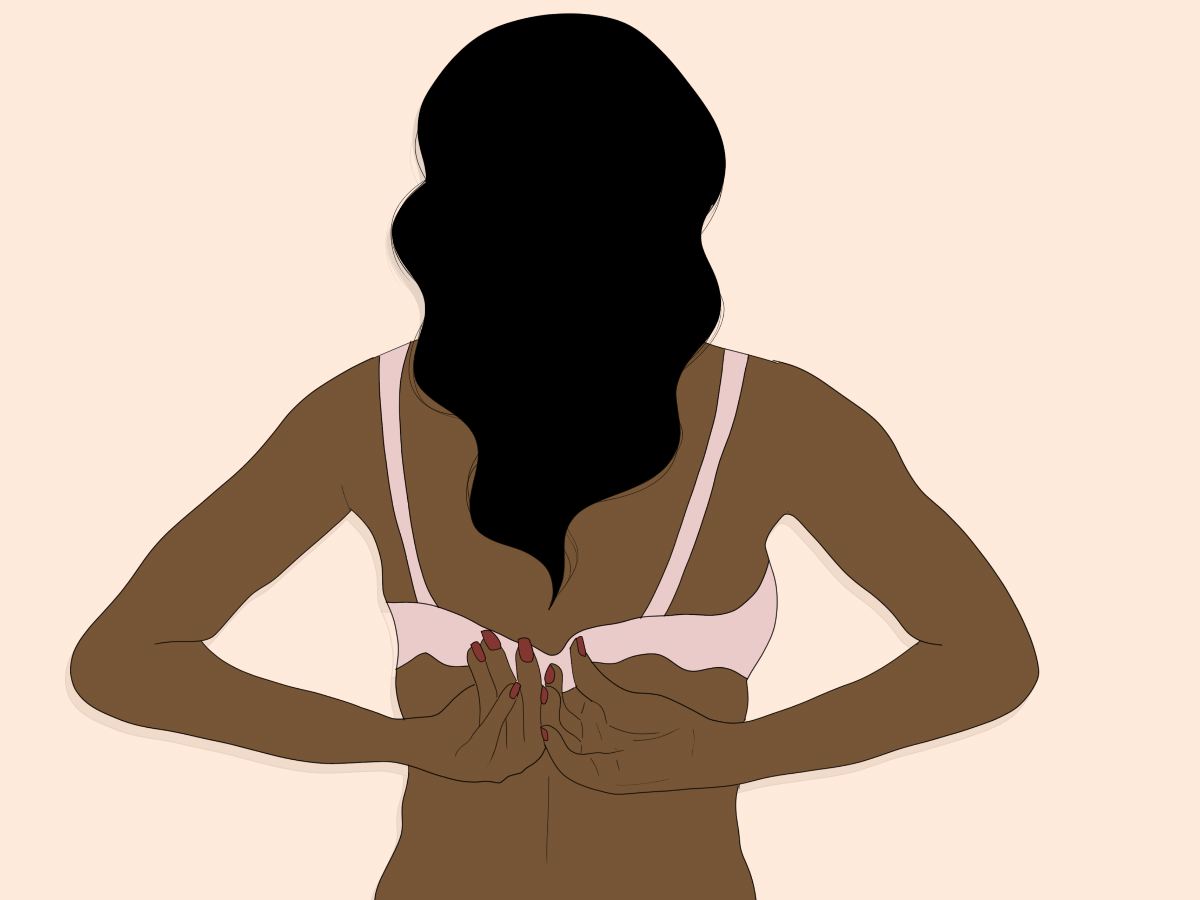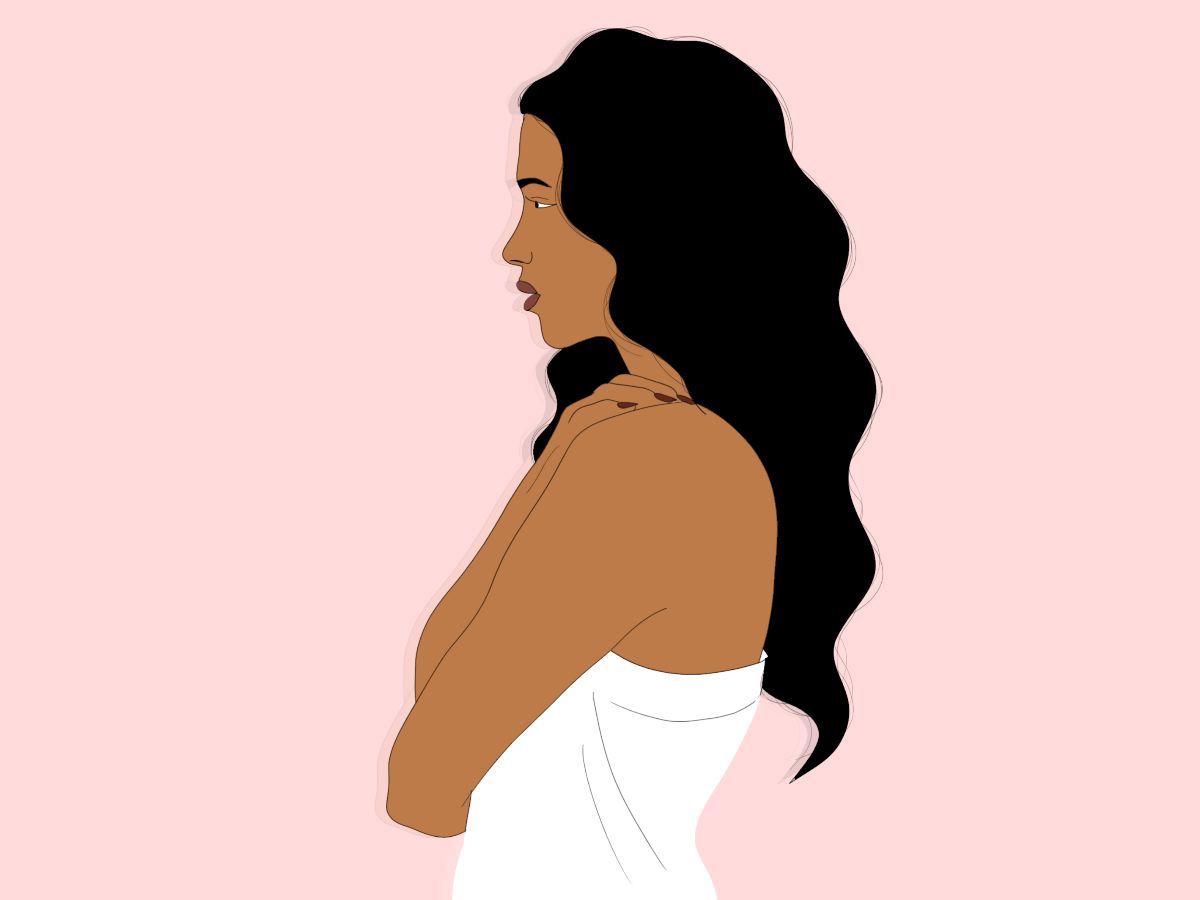I weigh more than my boyfriend.
I still can’t quite believe that I’m putting this on the internet, but here we are. And despite publically sharing about my near long decade of subpar and orgasm-free sex, this feels scarier.
In May, this romance free year took a turn, mostly because I fell in love. But that doesn’t mean it’s over. This series has meant more to me than I know how to explain. Hopefully, it’s meant something to you as well.
Now, let’s talk about weight.
I’ve done this thing for as long as I can remember. Before leaving the house, in fitting rooms, before dinners with friends. I conduct a sit test. It’s where I raise one of my legs and bend my knee, so it appears as though half of me is sitting in a chair. The half I learned to hate, my stomach.
The first time I ever did this in front of someone, I was trying on new clothes and one of my best friends was sitting in my living room, looking at me like I’d just eaten the fabric. That helped me realize that maybe not everyone conducts a sit test.
Maybe people are living free and fulfilled lives despite their stomach fat, thigh jiggle, or double chins. That there could be a world where you’re rolling out of the jeans you love so much after one of the best meals you’ve had in a hot minute, carefree of the belly rolls, was foreign to me. That your thigh jiggle could own the dance floor. Your double chin could take over due to laughing so hard it hurts but in a good kind of way. Preposterous.
Except it’s not. Welcome to body liberation: the freedom from social and political systems of oppression that designate certain bodies as more worthy, healthy, and desirable than others.
I can tell you the exact minute I realized I was fat
Or rather, my brain convinced me of that due to society’s ridiculous requirements of women. We need hair, long and luxurious, but only on our heads, nowhere else. We need to be curvy, but with no cellulite. We have to be smaller than our significant other.
When I was twelve, I put myself on the Special K diet. Then I became a vegetarian. Then it was no carbs and zero sugar. After that, Weight Watchers. All before I entered high school. Do you want to know what I weighed? 112 lbs.
If I could go back, I’d tell that little girl how fucking gorgeous she was regardless of the number on the scale. My family is like so many. They love to comment on other people’s bodies. They’re quick to compliment when they see you’ve lost some weight, but are happy to stay silent when it’s clear to them that you’ve “put on a few.”
Once, at my senior year capstone performance my cousin, who I love like a sister, shamed me for my breasts showing. If you ask her about it, I’m sure she either doesn’t remember or never realized the impact it had. But there I was. 21-years-old in the most expensive dress I’d ever bought for myself, ashamed of my body, embarrassed by my breasts. And there was nothing I could do to fix it, at least, not at that moment.
It took me almost five years after that encounter to have the confidence to leave the house without a bra again. And I partially have the pandemic to thank for that.

I learned so much after entering the body liberation movement. I stopped calling myself #midsized and no longer allowed individuals to have permission to comment on my body. The fact that racism is deeply rooted within fatphobia became aware to me. As did the privilege my body holds. I can walk into almost any store—screw you Brandy Melville—and fit into the clothes. But none of that, while very true, takes away from the struggle of living in recovery from an eating disorder.
It’s been a little over a year since I’ve binged and purged. And while that is a huge accomplishment, my sit tests, my occasional restrictive eating, my mental comparison where I rank all the humans I’m with to see if I’m the “thinnest” or the “fattest” amongst the group. That’s my eating disorder.
The more I let it control me, even just in those small ways, robs me of my happiness and my freedom. And it isn’t even so much of a robbery as it is me freely trading those joys for illness. The same illness that convinced middle school me that I needed to count my calories.
If you’re new to this conversation, welcome. And if you are familiar with feeling like your value is directly related to your weight, I’m so sorry.
I highly—like screaming from the rooftops—recommend you follow Megan Jayne Crabbe (@bodyposipanda), Nyome Nicholas-Williams (@curvynyome), Kellie Brown (@itsmekellieb), and Mik Zazon (@mikzazon) on Instagram. They are some of the incredible humans who’ve changed my life.
And while we all have too many books on our nightstands just waiting to be read. At least, I know I do. I hope you take an honest moment to read Fearing the Black Body: The Racial Origins of Fat Phobia by Sabrina Strings. Then maybe What We Don’t Talk About When We Talk About Fat by Aubrey Gordon.
Because I live in recovery from an eating disorder, much like I live in recovery from alcoholism, except I can’t be sober from food, I don’t own a scale.
I weigh the most I’ve ever weighed in my life and I can tell because of the way my body feels. But I’m also having the best fucking time.
Lately, I’ve given myself permission to eat whatever I want. I’m no longer judging clothes based on how they look but instead based on how they make me feel. And I am constantly, but joyfully reminding myself that this world does not require a sit test.
I’m currently looking for a new doctor because when you move across the country, it’s one of the adult to-do list items. And the first physician I saw, who, after sitting in the room with me for no more than ten minutes, stated that while my blood pressure, heart rate, and lung capacity were excellent, I needed to stop gaining weight. Then he tacked on how I needed to immediately lose 20-30 pounds. Needless to say, I didn’t go back to him.
The second labcoat, she told me to stop eating cake and cookies, despite never actually asking me what it is I eat. And these experiences don’t even come close to those who don’t live in a thin passing body when talking to labcoats. They don’t want to get to know you, just where you fall on the BMI.
Except, guess what? You don’t need to be weighed at the doctor. You can say no when they ask you to get on the scale. Or, at the very least, get blind weighed. Pro tip: if they are unfamiliar with that term, it’s safe to assume they aren’t the medical practice for you.
My boyfriend is smaller than me. I can’t fit into his PacSun skinny jeans and I don’t care. Sure, some days it weighs on me, no pun intended, but those thoughts aren’t mine. They were put there by society. Marketing and photoshop gifted me my anxiety around my stomach and double chin. Every single damn time this world values thinness over anything else, especially health, that’s where my intrusive thoughts and eating disorder come from. And what do I do when something doesn’t belong to me? I return to sender.
Find more relationship articles here >
Written by Tori Muzyk
Illustrated by Francesca Mariama

